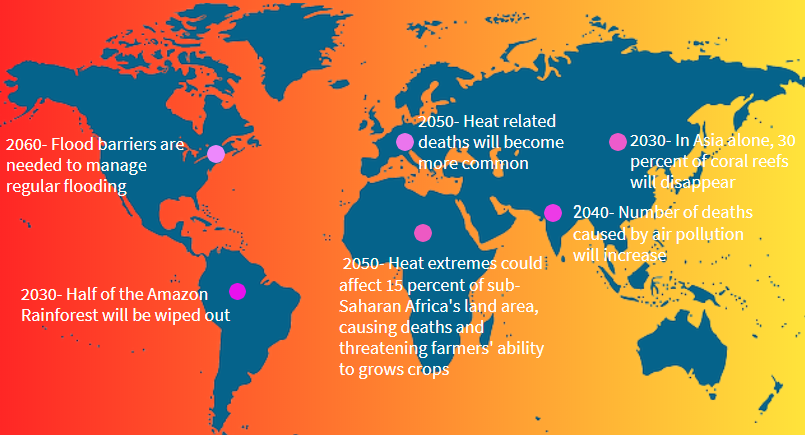Time is running out for the world
March 25, 2019
By the year 2030, the global average temperature will rise above 35 degrees, leading to higher temperatures that will cause arctic ice to melt and potentially lead to a worldwide flood. By 2040, at the current rate greenhouse gas emissions are being released, coastlines will be wiped out, intensifying droughts and poverty due to the destruction of infrastructure. These are only a few statistics reported by The New York Times, and the quickly approaching devastation of the earth should serve as a wake-up call that action must be taken to save the environment. However, these dire consequences only scratch the surface of the damage the globe will experience.
According to Vox, 150 million premature deaths as a result of air pollution- twice the number of casualties in World War II- could potentially be avoided by the end of the century if average temperatures can be controlled. However, no matter how many jarring statistics are released, it seems that the majority of people aren’t taking the initiative to ease the effects of their carbon footprint.
“It’s hard to imagine and comprehend a world with no ice, less animals and other scary things as teenagers because we haven’t seen much change in our lifetime,” junior Samantha Marstall said. “If we physically can’t see the change happening, we choose to ignore it so that we don’t have to change our lifestyle.”
Some politicians such as Senator Ed Markey and Representative Alexandria Ocasio-Cortez have taken steps to address global warming by creating the Green New Deal, an ambitious plan to tackle climate change. According to The Atlantic, it calls for a 10-year national mobilization through significant investments in infrastructure and carbon-free energy. However, the proposed deal would require trillions of dollars and extensive new taxes and federal programs, making it unlikely that the plan will be carried out effectively any time soon.
“An article I read in The Economist stated that if we did transition to 100 percent clean energy, the private sector would be devastated,” junior Alexander Yee said. “There’s no way that we can have all the inexpensive energy we get from fossil fuels from wind, solar and water energy sources.”
Nonetheless, change doesn’t have to start with policies. Everyone’s actions affect the environment, and anybody can make an impact with some effort. According to the Environmental Protection Agency, a person who can stay off the road just two days per week can reduce greenhouse gas emissions by an average of 1,590 pounds. If an office building of 7,000 workers recycled all of its office paper waste for a year, it would be the equivalent of taking almost 400 cars off the road.
“People usually don’t do things to help the environment because it seems like one person can’t make a difference,” AP Environmental Science teacher Anne Fenton said. “But when one person starts caring about the environment, it can inspire others and create a domino effect, so the effort will pay off.”
Unfortunately, despite the abundance of evidence that the climate is changing, some refuse to believe it. According to a 2018 Monmouth University poll, 54 percent of Americans consider climate change a very serious problem, but a vast majority of politicians have not made it a priority, some even referring to it as a “hoax.”
“Politicians don’t believe in the apocalyptic predictions of climate change because it attacks the very basis of their political power,” Yee said. “Capitalism is fueled by fossil fuels and rapidly growing industry.”
In order to resist climate change, it is important to recognize and hold accountable the 25 companies cited by the Carbon Majors Database Report to be responsible for 50 percent of carbon emissions. Only then will real results occur. Without addressing climate change immediately, future generations will have to experience the alarming effects.
“People need to realize that climate change is not something happening in the future, it is happening now,” Marstall said. “We can’t choose whether we will be affected by climate change, but can choose whether we will do something about it.”


